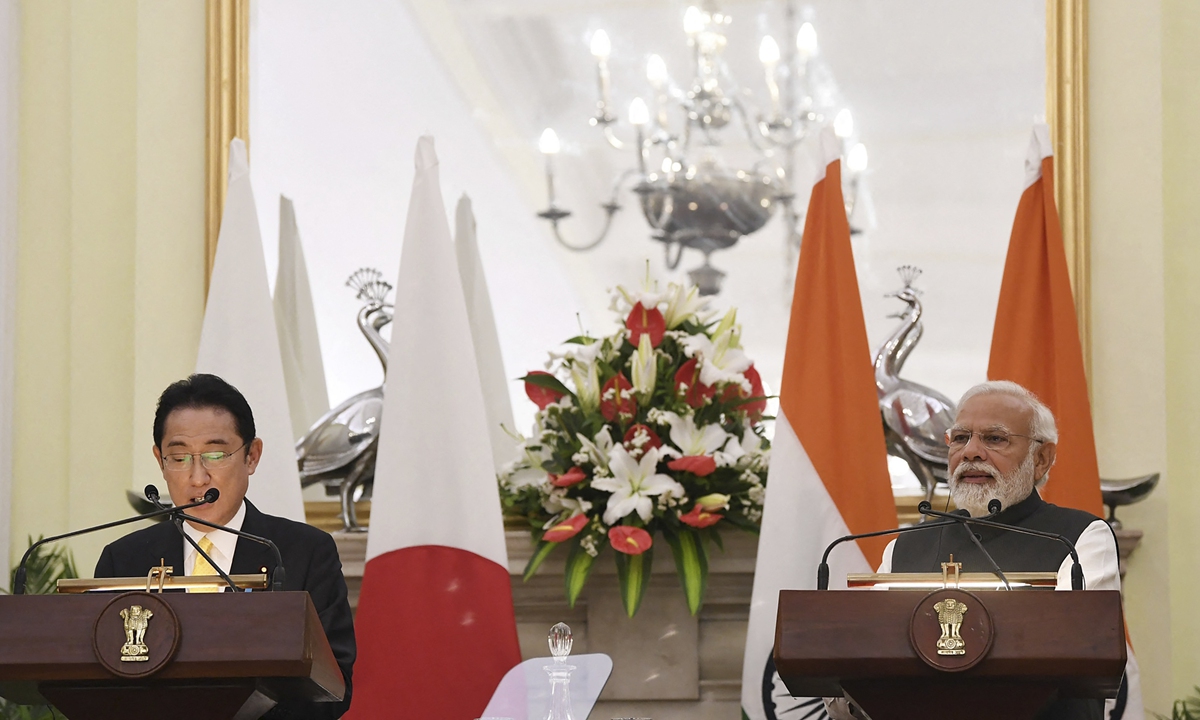Adhering to autonomous foreign policy, Modi immune to Kishida’s push on Ukraine crisis

Japan's Prime Minister Fumio Kishida meets with his Indian counterpart Narendra Modi during a press statement after their meeting at the Hyderabad House in New Delhi on March 19, 2022. Photo: AFP
If a country wants to gain strong international influence and build a positive global image, it must achieve autonomy in terms of foreign policy. It should proceed from its own national interests and decide its own foreign policy according to the rights and wrongs of the matter, rather than blindly follow and cater to one country against another.
Japanese Prime Minister Fumio Kishida on Saturday pushed India for a clear response to the Ukraine crisis and a tougher line on Russia when meeting his Indian counterpart Narendra Modi, according to media reports. But their joint statement later the same day did not mention Russia. In terms of the Ukraine crisis, the statement only said lines like Kishida and Modi "reiterated their call for an immediate cessation of violence and noted that there was no other choice but the path of dialogue and diplomacy for resolution of the conflict."
"This stance has not changed from India's previous statement. India stands by its position and policy on the Ukraine crisis. It will not change because of Kishida's push and Japan's further economic cooperation with India," Qian Feng, director of the research department at the National Strategy Institute at Tsinghua University, told the Global Times.
Japan's urging to some extent is to help the US to push India. New Delhi's neutral position over the Ukraine crisis has triggered constant concern in Europe and the US recently. Even pressure from Washington toward New Delhi is futile, let alone from Tokyo. Japan's push is of little significance. "This is because India has a clear picture of the current international environment. India knows that pressure from the US and Japan will be limited, as they need to rope in India to contain and suppress China," Lan Jianxue, head of the Department for Asia-Pacific Studies at the China Institute of International Studies, told the Global Times.
A primary trigger for the different attitudes of Japan and India toward the Ukraine crisis is their different foreign policy - Japan is following the US' lead, while India pursues an independent foreign policy. Since World War II, the US-Japan alliance can be seen as a kind of cornerstone of Japanese foreign policy and in many cases, Japan's diplomacy should follow the US. This is the limitation of Tokyo's foreign policy.
"In modern international relations, the relationship among allies is not equal and there must be a side dominating the alliance," Yang Xiyu, a senior research fellow at the China Institute of International Studies, told the Global Times. "In Japan's political lexicon, there is not even the word 'independence.'"
India is one of the founding members of the Non-Aligned Movement, which in essence underlines autonomy. India tends to adjust its foreign policy according to different agendas, and therefore is not totally inclined toward any country. This helps New Delhi maintain its position on the international stage and serves its ambition to become a great power. Furthermore, India has maintained friendly relations with Russia for decades. Russia is India's largest arms supplier, according to media reports and India has a large appetite for Russia's energy. As a result, India's stance over the Ukraine crisis is understandable.
New Delhi's practices on adhering to autonomy and avoiding hitching itself to Washington's chariot will prevent it from losing a traditional friend like Russia, help maintain its national interest and gain international influence.
But Japan's moves to follow the US in condemning and imposing sanctions against Russia will make Japan's geopolitical environment worse. As a result, Tokyo's ties with Moscow will be affected and the territorial dispute between the two sides will be clouded. It can be concluded that closely tying its diplomacy with the US' hegemonic strategy will make Japan harder to defend its national interests.

